John Mueller Discusses Website Downtime And Its Impact On Rankings
- 5 August, 2021
- Jason Ferry
- SEO Audit

Online businesses and site owners should always conduct an in-depth SEO audit online to determine their website’s overall status and see the areas that need improvements. An SEO audit can also prepare webmasters in case their site experiences downtime. Recently, Google’s John Mueller explained how website downtime affects one’s rankings.
A person began the discussion by posting on a Reddit thread, asking if it’s still possible to recover lost Google rankings after downtime of almost five days.
The site owner shared that there was a steady increase in their organic search traffic. However, an unexpected technical issue took their site offline. They worked on it, and after getting it back up and running, they found out they have lost 10,000 organic visits per day. The SEO said they had resubmitted their sitemap to ping Google to crawl their web pages again. But they are lost on what to do afterwards.
Google’s John Mueller On Recovering Rankings After Downtime
Mueller answered that a website could recover its rankings after downtime, but it would take one or two weeks for a complete recovery. But he added that if the site fails to recover its rankings within the said timeframe, the downtime is not the cause of the drop. Mueller then wrote a lengthy follow-up comment to elaborate on his answer.
According to Mueller, Google does not perceive website downtime as a quality issue. Instead, it is seen as a technical problem. Temporary downtime is not necessarily seen as a bad thing by the search engine.
A website will not suffer from a drop in its rankings unless it has been down for a few days. If the website is unreachable and its URLs returns HTTP 5xx, Google will retry over the next few days. During this time, nothing negative will happen to the site ranking or indexing.
On the other hand, if the site returns HTTP 4xx – for instance, 410, 404, and so on – Google would start deindexing its web pages. Although it is not a ranking drop technically, a deindexed page will not receive any search traffic, and the total traffic will soon drop.
Mueller estimates that it will take a week of downtime before the site owner notices a drop in their indexed pages. By this time, Google will start dropping URLs since they do the process on a per-URL basis and only recrawl significant URLs.
He also shared that Google recrawls most URLs in the range of hours to months, so in many cases, people would see a drop in their indexing within the first week. In the person’s situation, they noticed it after five days. And as Google recrawls and drops the remaining pages, it will continue to taper off for the next few months.
But if the website owner found a way to fix the technical issue and have their site up and running again, Google will reindex the site’s pages with the same rankings they had before. This solution will work as long as they address the problem within a few days after the downtime. Therefore, the faster a site owner fixes their website, the faster the site recovers.
Websites usually contain many pages, so Google will prioritise the important ones, which will recover faster than the others. And although the pages’ rankings will eventually be restored to normal, Mueller admitted that it could take more time for all the signals to get reassociated. The speed of recovery depends on how much a website’s rankings have dropped, as well as the state of its indexing and internal linking.
Google May Protect Websites Experiencing Downtime
Based on Mueller’s observation, he believes that Google protects websites from any adverse effects caused by downtime. He shared that he has seen many sites come back quickly after downtime, and their rankings recover faster than they dropped.
He also believes that Google has protections against dropping out of the index; for instance, the search engine may slow down its crawl rate for the website. And when the site comes back, Google springs into action and does everything it can to get the rankings back as quickly as possible, usually by increasing the crawl rate.
What If Rankings Don’t Recover After Downtime?
Unfortunately, not every site owner experiences a speedy recovery for their indexing and rankings after downtime. Mueller said that if rankings do not recover even after the site owner fixed their website, one must assume that the cause is not the downtime but another issue, like an algorithm update.
Sometimes, algorithm updates occur at times one would least expect, and when this happens, the search engine systems can recognise this awkward timing of quality changes. Google regularly makes algorithm updates and revaluates its systems over time. Even though a site downtime does not trigger a re-evaluation, it can happen simultaneously.
Lastly, Mueller advises everyone not to assume that search rankings will automatically go back to normal after a temporary drop in indexing. One should still take the necessary actions to fix the issue because the problem will never resolve itself.
Three Reasons For Website Downtime
Site downtime could be caused by one of the following:
- Server-side issues – One should maintain or upgrade their servers to ensure that they can meet the site’s evolving needs. If the server crashes, the site will start dropping incoming traffic.
- Cyberattacks – Sometimes, cyberattacks can cause an overload in the server, which leads to site downtime. Therefore, it is crucial to strengthen a website’s cybersecurity.
- Software and hardware issues – Poorly-coded websites will always face latency issues. Some of the most common causes of site downtime are accidental file deletion and coding errors.
To prevent these, one should get an SEO audit done to identify as many site issues as possible. Doing so can prevent many problems that could harm a website’s organic performance in the search engine results.
Work With The Best SEO Agency In The UK Today
If you need a team of professionals to take care of your website SEO, Position1SEO can help! We are experts who can improve your site traffic and search visibility in order to attract more paying customers to your business. This, in turn, leads to a higher return on your investment.
Thanks to our years of experience working with various clients from different niches, we have developed effective white hat tactics and a no-stone-unturned approach to guarantee your website a spot on Google’s Page 1.
By working with us, you can choose any kind of key phrase at any competition level. You can also select as many or as few key phrases as you like!
We will also provide you with a free, in-depth SEO audit online to ensure that we do not miss anything when working on your website.
If you are interested in our services, you can dial 0141 846 0114 or email us at office@position1seo.co.uk.















